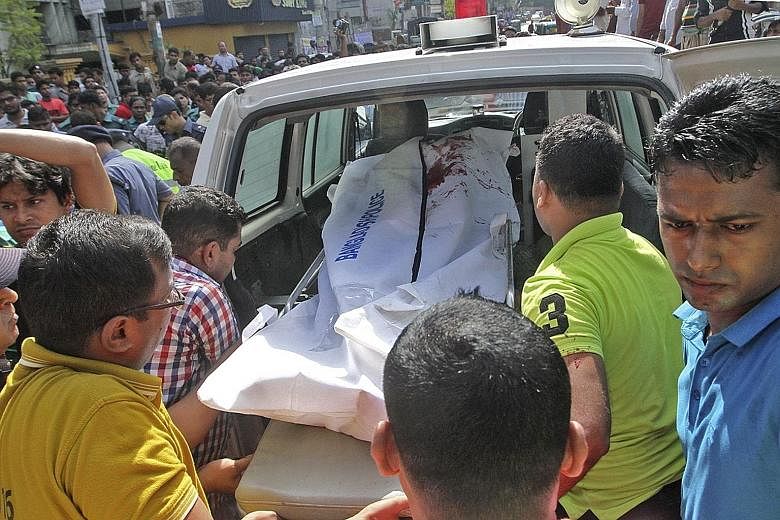DHAKA • The Bangladeshi authorities said they now believe they have identified the top leadership of the two Islamist groups responsible for a spate of gruesome killings that included bloggers, a Christian grocer, a Hindu priest and the wife of a police superintendent who had been cracking down on militants.
The victims were often killed with machete blows to the back of the neck, with the murders accelerating lately.
For the past three years, atheist writers, free thinkers, foreigners, religious minorities, gay rights activists and others have been terrorised and killed in Bangladesh by shadowy figures who struck with machetes and sped off on motorbikes.
Police now say the killings were organised by two Islamist militant groups that gathered volunteers and recruits, trained them and eventually placed them in cells run by a commander, said police counter- terrorism unit chief Monirul Islam.
One group, Ansar al-Islam, is led by a fiery cleric and a charismatic, well-trained operational commander, both of whom Mr Islam declined to identify because they are being watched. Its leaders command about 25 trained killers.
The second, Jamaat-ul-Mujahideen Bangladesh, is the reorganised offshoot of a group banned in 2005 for setting off nearly 500 bombs simultaneously around the country.
While both are radical Islamist groups, Mr Islam said, neither seems to have direct links to larger terrorist networks such as Al-Qaeda and the Islamic State in Iraq and Syria, though those groups have occasionally claimed credit for the attacks.
Muslim-majority Bangladesh gained independence from Pakistan in a vicious war in 1971 and established a secular, democratic government.
A military coup in 1975 led to more than three decades of mostly military-backed governments sympathetic to Islamic fundamentalists, until a secular government returned to power in 2009 with an overwhelming majority.
But secularism is far from universally accepted in Bangladesh and has always had to contend with a conservative Islamic culture.
"In general, people think they (the murderers) have done the right thing, that it's not unjustifiable to kill" the bloggers, gay people and other secularists, Mr Islam said.
The attacks have also put the secular government on the defensive. Even as the government has condemned the killings, it has urged writers not to criticise Islam and warned that advocating "unnatural sex" is a criminal offence.
Some experts have said that only a more widespread crackdown will stop the killings, but that the government has held back, fearful of creating a backlash.
"The politics has been turned into the secular versus the Islamists," said Mr Abdur Rashid, a retired army major-general and executive director of the Institute of Conflict, Law and Development Studies in Dhaka. "Therefore, the government is cautious."
NEW YORK TIMES

